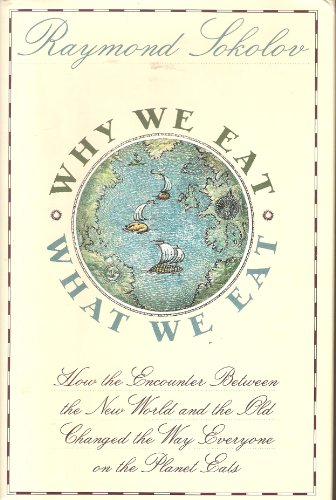Synopsis
Examining how the "discovery" of the Americas set in motion a transformation of food cultures around the world, this look at the five-hundred-year revolution in food history explains how Europeans, Americans, and Asians came to eat what they eat today.
Reviews
Sokolov ( The Jewish American Kitchen ) has scoured published sources and ventured as a dedicated "gastroethnographic reporter" throughout the "Hispanic diaspora" of the New World to chronicle the collision of ingredients and culinary traditions resulting from Columbus's voyages. Readers who have never considered whether or how the various cuisines of the New World relate to one another--or who have never thought much about the progress of the chili pepper through Africa, Europe and Asia--will be moved to view regional food traditions quite differently. The author doesn't miss an opportunity to submit revisionist insights: that Puerto Rico offers "the most complex tangle of culinary influence and geography in the world" (he chides New Yorkers for neglecting it); or that Philippine dishes somewhat resembling Spanish paella are actually native, rather than evidence of Spain's mercantile empire. Sokolov, a hands-on researcher, is also an anecdotalist of warmth, skill and appetite who knows how to wind through the complexities of culinary history.
Copyright 1991 Reed Business Information, Inc.
It's not news that tomatoes, chilies, potatoes, and corn are New World foods, or that the Spanish introduced European livestock and their dairy products to America. Here, Sokolov (How to Cook, 1988, etc.) goes well beyond these grade-school givens in tracing how Columbus's bumbling discovery began a process of transoceanic cross-fertilization that changed the world's cuisines. Most interesting is Sokolov's examination of a half-dozen distinctive New World cuisines--Mexican, the great example of a truly mixed and integrated melting pot; Peruvian, in which native and Spanish cuisine developed side by side; that of Cartagena, Colombia, a black city fed on African, local and Spanish ingredients prepared by Spanish methods, etc.--and how each evolved in its own way depending on the indigenous cuisine and agriculture and the social, political, and population makeup of the colonial societies. As for Europe, the distinctive national cuisines we know today (largely from their codification in cookbooks of the l960's and 70's) did not arise until well after Columbus's time and would be unrecognizable without their New World staples. Today we are experiencing a virtual global meltdown based on immigration (``colonization from below''), technological advances (jet travel and refrigeration), the rage for novelty, and the Americanization (in our case) of the French nouvelle cuisine, which Sokolov sees as a witty and ironic parody of that country's old haute cuisine. There is some wit to Sokolov's own take on this ``post- modern'' period, and much to chew on in his tracking down of the complexities of the earlier revolution. -- Copyright ©1991, Kirkus Associates, LP. All rights reserved.
This delightful discourse by a well-known food writer shows how the world's culinary traditions were radically transformed after 1492. Columbus's introduction of New World foodstuffs to the Old World and vice versa led to the establishment of national or ethnic cuisines. Sokolov discusses in some detail the evolution of these New and Old World cuisines--Mexican, Philippine, French, and Chinese, to name a few--and describes the ingredients responsible for reshaping the cooking of these countries. He explains how America's traditional cuisine is the result of many separate collusions between immigrant groups applying what they knew from the old country to what they found in the new. And, finally, Sokolov explores the world of nouvelle cuisine, illustrating how it subtly combines exotic ingredients from the East and the West. This thoroughly researched, thoughtfully presented history should be purchased by all libraries with active food/cooking collections. Previewed in "Rediscovering Columbus," p. 120-122, LJ 8/91.
- Linda Chopra, Cleveland Heights-University Heights P.L., Ohio
Copyright 1991 Reed Business Information, Inc.
"About this title" may belong to another edition of this title.
